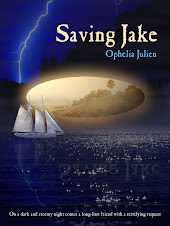Buddy and fellow writer, Jan Hinds, recently announced a contest asking her readers to help her name a character in the book she is currently writing. That's a fun thing to do. And very brave,
I have also met a writer who, when she is working on a new story and doesn't have time to think up names, will write using "A", "B", etc. to designate her characters. For me, that's an impossible thing to do.
I need my characters' names before I can write them. For me, the name tells me so much about his or her back story. I can't even imagine being able to write about a character that hasn't been properly introduced to me. And what a battle that can be.
When I'm lucky, someone like Jake Holdridge will ring my doorbell, and wait for me to open the door and meet him. And when I opened that door and found him on my doorstep, he had turned up in his thrift-store trench coat, his red high tops, his shoulder-length hair (that looked like he cut it himself, because he did), and his one earring. To me, everything about his appearance and demeanor screamed "artist" and we were off to the races. EXCEPT that Philip Corts wanted nothing to do with either of us. I got his name very, very grudgingly, and even then, he wouldn't talk to me. That's why Saving Jake is written in first person from Philip's point of view: he wouldn't let me see enough of him to write about him in third person. To this day, I'm not exactly sure what he looks like because he never looks in a mirror when I'm around. He lets me know what he's thinking, and shows me his particular talent, but I've never been face-to-face with him the way I have with Jake.
For the Bridgefield Cemetery books, Cassie, like Jake, was breathing and speaking when I met her. I know what she looks like. I know how she thinks and what she feels about things and what motivates her. The same is true of both Eloise Janks and Nick Borja ,who came right through the front door with her and were also quite easy to get to know. Michael Penfield, on the other hand, was difficult. He didn't throw up actual roadblocks the way Philip did, but Michael wouldn't let me have his last name for months. All I knew was that it began with the letter "P." (Those who really know me will understand why I would name a character "Michael P", and it's all about paying homage to someone.) At any event, it took long weeks of trying names on and taking them off again, like pairs of shoes or a selection of hats, plus a trip to Door County, to find out his last name is Penfield.
Why do characters do that?
For me, a character's name is as important as any story he or she is going to share with me. In fact, a lot of what they do and how they behave are anchored in their names, at least for me. Cassie Valentine could never have been a Melissa Conway or a Jeannette Mayer or a Tiffany Anything, and be able to get the stories of dead people. She is Cassie Valentine and was always meant to be. Philip Corts could never have been a Walter Lennox or a Brent Hanlon or a Justin Thorne, and have psychometry as a gift. His ability is hard-wired into his name.
Thank about stories you love and the possibility of any of your favorite characters having a different name. Doesn't it change the flavor of the experience just a bit? (If it doesn't, you're lucky, and I'm neurotic. The second part of that sentence has always been true, though.)
Figuring out the names of my characters has always been part of the magic when coming up with a new story. I try names out and discard them until I get the "Rumpelstiltskin" magic, and then I'm off and running. It's sort of like looking through recipes until I find the one that's perfect.
I understand not all writers work like I do in terms of naming their characters. Holding contests and substituting alphabet letters aside, I'd sure like to know how those writers finally get to meet the folks whose stories they tell.






No comments:
Post a Comment